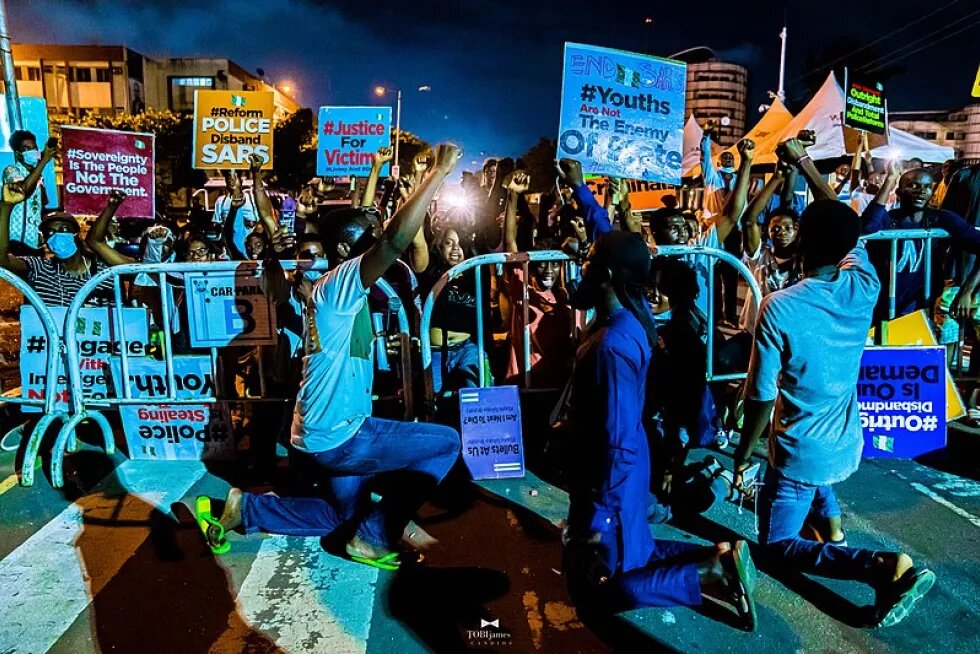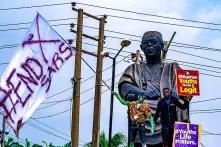The recent protests under the #EndSARS movement may be an indication of a new political era as young people find their voices and the courage to demand better governance.

On the 3rd of October 2020, a video surfaced on social media of police officers in the town of Ughelli, Delta State struggling with a young man beside a white Lexus SUV, shooting him and then speeding off in his car. The police officers, identified as being members of the Special Anti-Robbery Squad (SARS), a unit that has become infamous for human rights abuses, were given a hot chase by other motorists. Although the Delta State Police Command has denied that the police officers in question were SARS officers and that the victim was not shot or killed, this did not stop the incident from triggering the largest protests Nigeria has seen in decades tagged #EndSARS.
The gross human rights abuses of the Nigerian Police Force in general, and of SARS which was set up in 1992 to fight violent crimes such as armed robbery and kidnapping in particular, are well-documented by numerous reports by local and international human rights organizations for at least 30 years. The unit operates in anonymity by design – using unmarked cars without uniforms and name tags in order to use the element of surprise on violent criminals. Unfortunately, this cover has been abused by the unit to commit atrocities.
There has hardly been a week that a complaint against the unit has not been made on social media, especially since 2017 when Nigerians started calling for the scrapping of the unit and organised first protests.
The response of government to these calls over the years can be best described as tepid: on multiple occasions, the Federal Government and the police high command has pledged to reform, reorganize, and even disband the unit – but nothing has changed. Numerous panels and committees to examine the police in general, and in some instances focused on the SARS unit, have been set up since 2006 by the Federal Government with their reports not implemented, thus sustaining the deep-rooted and systemic problems of the police force.
It is this inaction by the government and its practice of kicking the can down the road while Nigerians continue to suffer the brunt of terrible policing and human rights abuses that have made the anger to swell and boil over into the current protests. It may have been triggered in particular by the video of the shooting of the young man in Delta State, but it is the cumulative result of years of Nigerians speaking out against police brutality without any efforts to bring the officers responsible to book and to implement reforms within the police force that will prevent the recurrence of those abuses.
One will be hard-pressed to find any Nigerian that has not had or does not know who has had an unsavoury encounter with the police. It ranges from the relatively benign such as demanding bribes at checkpoints to the egregious ones such as extortion, illegal detention, arraignment on trumped-up charges with no access to legal representation and even outright extra-judicial killings and murder.
However, it is young people who have disproportionately felt the brunt of police brutality, with numerous incidences of SARS officers arresting them based on the very faulty profiling based on dressing, hairstyles, types of mobile phones used, possession of laptops or flashy cars. In truth, anything can be used as justification by SARS to arrest and harass young people with the attendant brutality and abuse of their rights.
As such, it is not surprising that it is these young people that have been at the forefront of the protests against the unit and wider police brutality, employing tools they use daily and in civic spaces that they have come to own for their freedom of expression: the internet and social media. A simple and easy-to-remember catchphrase, #EndSARS, allowed for stories to be easily catalogued; the pictures and videos of incidences raised anger; local and global celebrities added their voices and raised the tempo. Soon, the hashtag was trending in Nigeria and worldwide and it went on for days without end.
Social media also became the means to organize offline protests and the combination of the two made it even more potent, ensuring that it was hard for local and international media to ignore what had become a movement of seismic proportions. Not only that, the protesters were strategic in blocking roads as an act of civil disobedience in order to force the government to take action on five clear demands that they had put out, which included the immediate release of all persons arrested in the protest, justice for all deceased victims of police brutality with compensation to their families, and the setting up of an independent body to oversee the investigation and prosecution of all reports of police misconduct within 10 days.
After several days of promising to disband the unit (again) and asking for dialogue with the protesters, the Federal Government finally acceded to the demands of the protesters. It also set up yet another presidential panel on police reforms to look at the reports of previous panels and develop an implementation roadmap and framework.
Unfortunately for the government, this did nothing to placate the protesters, who only swelled in numbers, continued to block roads and insist that the government had not done enough. This is not without reason too, considering that previous protests had elicited similar reactions but without actions taken. As a result, government has lost the trust of its citizens and needs to rebuild that by taking immediate actions that will end the protests in the short-term.
But the refusal of the protesters to back down has not been the only source of frustration for government – it is also the fact that the protests do not have any visible leaders as the movement employed a uniquely leaderless strategy. Again, this is not without reason as doing so protects those who would have been leaders from possible intimidation and harassment from the government and its agents. Not only that, it also protects the integrity of the movement by preventing the possibility of persons hijacking the movement for pecuniary gains and their political ambitions.
Yet, despite the absence of visible leadership, the protests have been well-coordinated across the country with teams formed to provide logistical, medical and legal help – the latter two for injured and arrested protesters respectively. While there are numerous organizations and individuals driving the protests, the most significant one undoubtedly is the Feminist Coalition, which was formed just this July to “champion equality for women in Nigerian society with a core focus on education, financial freedom and representation in public office.”
To date, the Feminist Coalition has raised about N77 million and has benefited from tweets directing donations towards them by Jack Dorsey, the co-founder and CEO of Twitter and global superstar, Beyoncé. Despite efforts to extinguish the protests by putting restrictions on their bank accounts and those donating to them, the Feminist Coalition has continued to trudge on, using the cryptocurrency, Bitcoin as a medium to send and receive money – another testament to the innovativeness of young Nigerians and how they are quick to adopt new technologies.
It is not altogether surprising that the women who make up the Feminist Coalition have emerged as the unofficial leaders of the movement – it is the result of organizing to demand for women’s rights and fight sexual harassment over many years. For example, in December 2018, fed up with sexual harassment they faced when going shopping in markets in Lagos, some young women organized an awareness drive against the harassment, tagged Market March. There have been smaller drives such as the Wine and Whine events where women have a safe space to interact and talk about desire for gender equality, and Sanitary Aid which provides free sanitary pads and other sanitary products to girls from low-income families. This is besides loosely organized support systems for women on a variety of issues: from increasing educational and economic opportunities to getting legal recourse in sexual violence cases.
The past few days have been difficult ones for the protesters with hired thugs attacking protests in many cities with fatalities and destruction of property which degenerated into even more violence and led to the imposition of curfews in as many as nine states, capped by soldiers shooting at unarmed protesters in Lagos – all broadcasted on the internet. The combination of these has sapped at the enthusiasm of the protesters and might have sounded the death knell for the street protests.
It then begs the question: where does the #EndSARS movement go from here?
Considering the loose structure that the movement employed for these protests, it is unlikely that it will continue in its current form. However, it has provided a huge opportunity for engagement with the government at all levels on reforming Nigeria’s policing and criminal justice system. For decades, local and international civil society actors have pushed for reforms without success. But the renewed attention as a result of these protests can be the catalyst for change if the pressure on the government is sustained.
Not only that, the #EndSARS protests are the biggest political event of a generation of Nigerians, the Gen Z, and even for many millennials, and have become a huge political awakening for those previously aloof from Nigerian politics. This provides a springboard for greater involvement of young Nigerians in the country’s political process – from voting to engaging government to joining political parties and running for elections.
#EndSARS might have started focused on demanding for the disbandment of a rogue police unit but in truth, it is igniting a social and political revolution in Nigeria.
This was aptly captured by Ibrahim Faruk, an active protester in Abuja, “For me, #EndSARS is more than just de-establishing the SARS tactical unit or about police brutality. It is a watershed moment in our history where in a never-seen-before moment of youth organizing and channelling of the anger and frustrations of being youth in Nigeria and having to deal with poverty, unemployment and inequality – as well as insecurity and police brutality – we have found our voice and are demanding accountability and action from our government.”
This was also echoed by Chioma Agwuegbo, a veteran of numerous political movements, “I am involved in this because I strongly believe we are on the cusp of something that can truly change Nigeria. I do not think we could have gone on for much longer. Just seeing this organic, leaderless movement saying ‘you can’t keep killing us’ is a welcome development.”
It remains to be seen how the momentum from the protests will be built upon, whether in the short-term or long-term.
The road ahead is long, but the journey has started.


